Chapter 7 Bankruptcy PA Lawyer
Top Bankruptcy Attorneys and Home Foreclosure Defense Attorneys.
Over 750 ★★★★★ Google Reviews

Contact Our Attorneys Today



EVALUATION
At Sadek Bankruptcy Law Offices, we realize that every situation is different. Our debt relief lawyers will take the time to learn about your situation and your goals. Our objective is to explain your legal options and offer the best debt relief strategy for you in the most compassionate and friendly manner possible. Call 24/7 to schedule your meeting with a lawyer.
AVAILABLE
Our office understands the financial stress our clients endure. Therefore, in addition to reasonable legal fees, we offer a payment plan to all of our valued clients to make quality legal services most affordable.
AND NJ
In addition to our primary law office in Center City, Philadelphia, we also have law offices throughout the Greater Philadelphia, Pennsylvania Area and in New Jersey. Our branch offices have contributed to making us the #1 Bankruptcy Filer and debt relief firm in the Greater Philadelphia area. Our goal is to have a convenient location within 20 minutes of where our clients work or reside.
Philadelphia Chapter 7 Bankruptcy Lawyer
The most common question a Philadelphia Bankruptcy Lawyer is asked by Bankruptcy Law clients is “What is the difference between Chapter 7 Bankruptcy and Chapter 13 Bankruptcy?” A Chapter 7 Bankruptcy is an immediate discharge or wiping out of unsecured debts.
Debts that are included in a Chapter 7 Bankruptcy include credit cards, medical bills, personal unsecured loans, timeshares, certain tax debts and more! It is very rare for a house or a car to be included in a Chapter 7 Bankruptcy except for very rare circumstances discussed below.

Chapter 7 Bankruptcy in Philadelphia Case
– Scenario 1 –
A Petitioner in a Chapter 7 Bankruptcy may choose to surrender their interest in a home, car or other secured debts that have become unaffordable due to loss of income or an unforeseen rising monthly payment. A Petitioner may also decide to surrender a house or car through bankruptcy because they do not have any equity in the secured debt.
For example, if one owns a home with a mortgage of $200,000, but the home is worth only $150,000, it may not be worth struggling on a monthly basis to meet the monthly mortgage payments, real estate tax and homeowner’ insurance obligations because the Petitioner has negative or no equity in the asset.
A Chapter 7 Bankruptcy would allow the Petitioner to surrender their interest in the home and seek alternative housing for a lesser monthly payment therefore decreasing monthly living expenses and building savings at the same time!
Chapter 7 Bankruptcy in Philadelphia Case
– Scenario 2 –
On the average, for every $10,000.00 of credit card debt, it costs $500.00 per month in minimum payments, which amounts to $6,000 per year. A Chapter 7 Bankruptcy would therefore erase the extraordinary monthly and yearly expense of carrying debt and increase a Petitioners monthly disposable income and potential savings.
Lastly, because the Petitioner in Chapter 7 Bankruptcy would no longer be carrying unsecured debt due to the discharge in Bankruptcy, it is very common for credit scores to rise.
Yes, filing bankruptcy Chapter 7 in PA improves credit sores. Reason being that since a Petitioner in Chapter 7 Bankruptcy is no longer responsible for credit card and other debts with outstanding balances; they have a more positive debt to income ratio in the eyes of the credit reporting agencies and accordingly a rising credit score.
What Is Chapter 7 Bankruptcy in Simple Terms?
Chapter 7 bankruptcy, often referred to as “liquidation bankruptcy,” is a legal process where individuals or businesses with overwhelming debt can seek relief by having their assets sold to pay off creditors. In a chapter 7 bankruptcy case, a trustee is appointed to oversee the sale of non-exempt assets, which may include possessions like a home or car.
Once the assets are sold, the proceeds are distributed among creditors, and the remaining debt is typically discharged, meaning the debtor is no longer legally obligated to pay it. Chapter 7 can offer a fresh start for those burdened by debt, but it also comes with consequences, such as the potential loss of property.
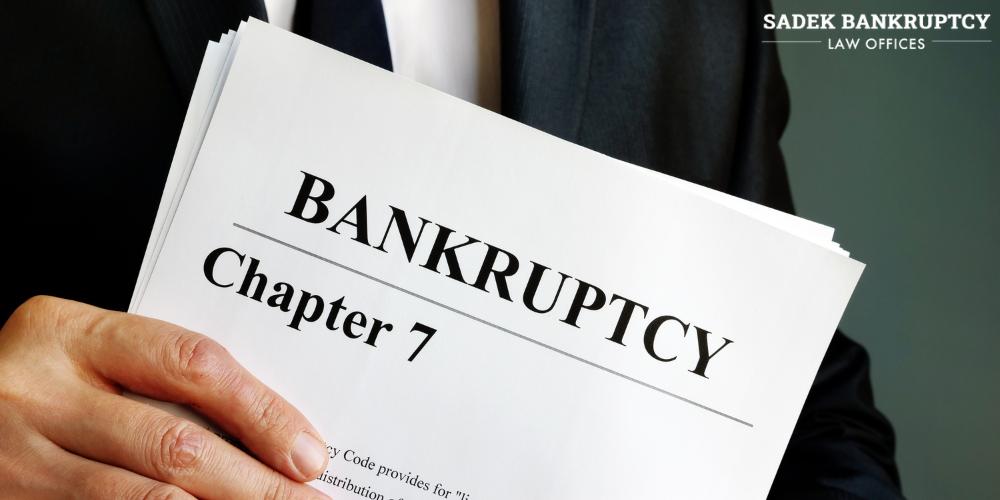
Chapter 7 vs Chapter 13
Chapter 7 bankruptcy, known as “liquidation bankruptcy,” involves selling off assets to pay creditors and typically results in the discharge of remaining debts. It’s often preferred by those with few assets and significant debt. On the other hand, Chapter 13 bankruptcy, called “reorganization bankruptcy,” allows individuals with a regular income to create a repayment plan to gradually pay debts back over three to five years.
Unlike Chapter 7, Chapter 13 doesn’t require liquidation of assets but instead focuses on restructuring debts. The choice between the two depends on factors like income, assets, and the desire to keep certain possessions.
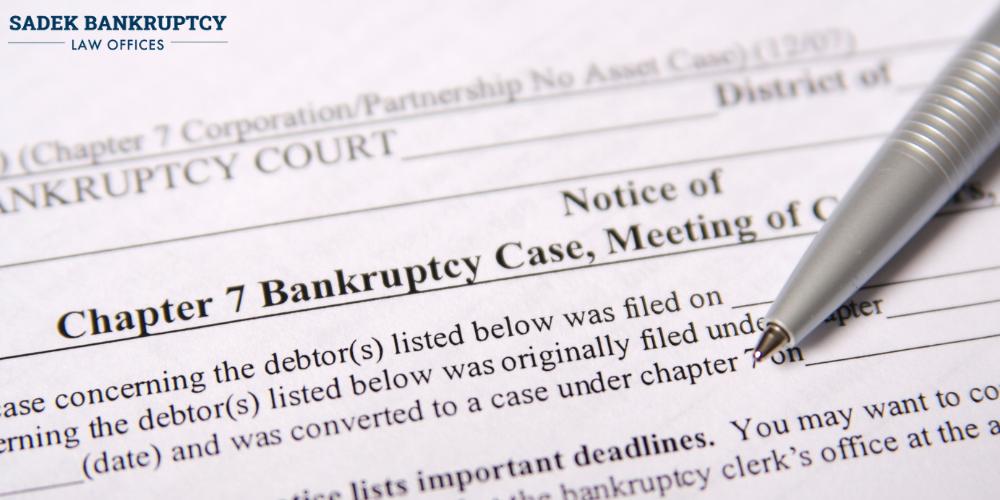
How to File Bankruptcy Chapter 7 in PA
Filing for Chapter 7 bankruptcy in Pennsylvania involves several steps. First, you need to gather all relevant financial documentation, including income statements, tax returns, and details of your debts and assets. Once you have this information, you’ll need to complete the necessary bankruptcy forms, which include a petition, schedules detailing your financial situation, and statements disclosing your income, expenses, assets, and liabilities.
You must also complete the Pennsylvania bankruptcy means test. The means test determines whether you qualify to file Chapter 7. If not, Chapter 13 may be a more viable option for your situation.
After completing the forms, you’ll need to file them with the bankruptcy court serving your district in Pennsylvania. Along with your paperwork, you’ll need to pay a filing fee, unless you qualify for a fee waiver based on your income level. Alternatively, you can request to pay the fee in installments.
Chapter 7 Bankruptcy Requirements
Chapter 7 bankruptcy has certain eligibility requirements individuals must meet to file under this chapter. These requirements are as follows.
- Means test: The means test evaluates your income and expenses to determine if you have enough disposable income to repay your debts. If your current monthly income is below the state median or you pass the means test, you’re typically eligible to file for Chapter 7. If you don’t pass the means test, you may need to consider Chapter 13 bankruptcy.
- Credit counseling course: Before filing for bankruptcy, you must complete a credit counseling course from an approved agency within 180 days. This course aims to assess your financial situation and explore alternatives to bankruptcy.
- Residency: You must have lived in the district where you’re filing for bankruptcy for at least the previous 180 days.
- Previous bankruptcies: If you’ve had a bankruptcy case dismissed within the past 180 days due to your failure to appear in court or comply with court orders, you may not be eligible to file for Chapter 7.
- Financial management / debtor education course: After filing for bankruptcy, you’re required to complete a financial management course from an approved agency. This course helps you learn budgeting and money management skills to rebuild your financial health after bankruptcy.
Chapter 7 Income Limits 2024
It’s important to remember that those whose income exceeds a certain amount usually do not qualify for Chapter 7 bankruptcy. As of April 1st, 2024, the following income limits for Chapter 7 bankruptcy apply for one to four people in the household.
- One earner: $66,923
- Two people: $81,574
- Three people: $103,172
- Four people: $125,861
How Does Chapter 7 Work in Pennsylvania?
First, the debtor files a petition with the bankruptcy court, initiating the process. This triggers an automatic stay, halting most creditor actions, including collection efforts and foreclosure proceedings, providing the debtor with immediate relief from creditor harassment.
Next, a bankruptcy trustee is appointed to oversee the case. The trustee’s primary responsibility is to review the debtor’s assets and determine if there are any non-exempt assets that can be sold to repay creditors. Exempt assets, such as basic household items and certain types of property, are typically protected from liquidation under state and federal bankruptcy laws.
The trustee sells any non-exempt assets and distributes the proceeds to creditors in accordance with the priority established by bankruptcy law. Unsecured debts, such as credit card debt and medical bills, are often discharged, meaning the debtor is no longer legally obligated to repay them. However, certain debts, such as child support, alimony, and most tax debts, may not be dischargeable.
Once the trustee has completed the liquidation process and distributed funds to creditors, the debtor receives a discharge, relieving them of most remaining debts. This discharge provides the debtor with a fresh start, free from the burden of overwhelming debt.
Means Test Chapter 7
The Chapter 7 means test is a crucial step in determining eligibility for filing bankruptcy under Chapter 7. It evaluates an individual’s income and expenses to ascertain whether they have enough disposable income to repay their debts. The means test compares the debtor’s average monthly income over the six months preceding the bankruptcy filing to the median income for their state.
If the debtor’s income falls below the median, they typically qualify for Chapter 7. However, if their income exceeds the median, further calculations are performed to assess disposable income and eligibility. If the disposable income is above a certain threshold, the debtor may be required to file for Chapter 13 bankruptcy instead.
Submit Your Bankruptcy Petition to a Pennsylvania Bankruptcy Court
Submitting a bankruptcy petition in the bankruptcy process involves several steps. First, the debtor gathers all relevant financial documentation, including income statements, tax returns, and details of debts and assets. Next, they complete the necessary bankruptcy forms, such as the petition, schedules detailing their financial situation, and statements disclosing income, expenses, assets, and liabilities.
Once the forms are completed, they are filed with the bankruptcy court serving the debtor’s district, along with any required filing fees or fee waiver requests. Upon filing, the court assigns a case number, triggering an automatic stay on creditor actions. Finally, the debtor attends a meeting of creditors, where the trustee and creditors may ask questions about the bankruptcy petition and financial affairs.
What Happens After Filing Chapter 7 in PA?
After filing for Chapter 7 bankruptcy, the automatic stay is initiated by the court. This stay is a legal injunction that halts most creditor actions against the debtor. It goes into effect immediately upon filing and serves as a powerful tool to provide the debtor with immediate relief from creditor harassment and collection efforts.
The automatic stay prohibits creditors from continuing or initiating collection activities, including phone calls, letters, lawsuits, wage garnishments, and foreclosure proceedings. This stay remains in effect throughout the bankruptcy process, offering the debtor a period of respite to address their financial situation without the constant pressure of creditor actions. Although the stay offers many legal protections for filers, we still recommend working with a bankruptcy attorney for your case.
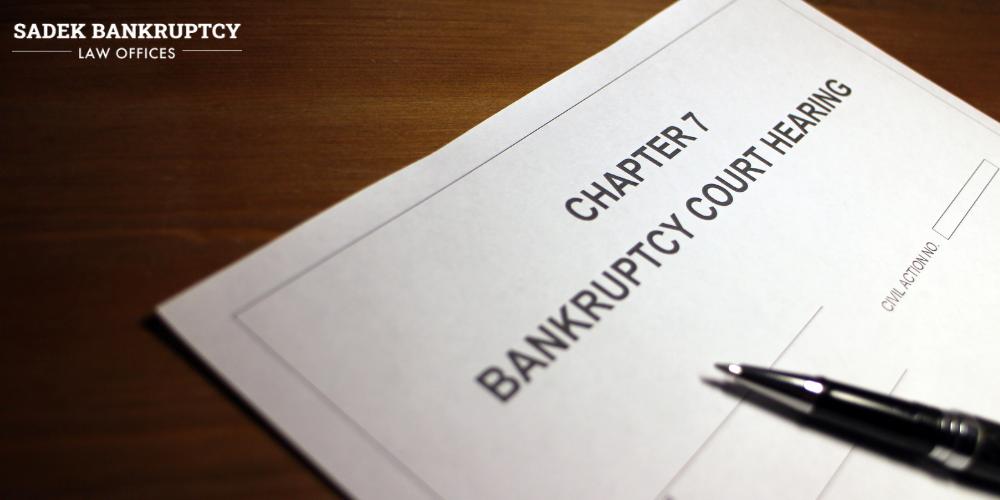
What Can You Not Do After Filing Chapter 7 in PA?
After filing for Chapter 7 bankruptcy, there are several actions that debtors are generally prohibited from taking. First and foremost, debtors cannot dispose of property or transfer assets to others, as this could be seen as an attempt to defraud creditors or manipulate the bankruptcy process. Similarly, debtors cannot incur new debts without court approval during the bankruptcy process. This includes taking out loans, using credit cards, or making significant financial transactions without informing the bankruptcy trustee.
Additionally, debtors are typically restricted from dismissing ongoing lawsuits or legal actions related to pre-bankruptcy debts without court permission. This is to ensure that all creditors have an opportunity to participate in the bankruptcy proceedings and have their claims addressed fairly.
Furthermore, debtors are generally not allowed to repay certain creditors selectively or favor one creditor over another. All creditors must be treated equally during the bankruptcy process, and any payments made to creditors outside of the court-approved process could be considered preferential treatment.
Finally, debtors are required to cooperate fully with the bankruptcy trustee and provide accurate and complete information about their financial affairs. Failure to do so can result in serious consequences, including dismissal of the bankruptcy case or denial of a discharge.
How Long Does Chapter 7 Bankruptcy Take?
The duration of Chapter 7 bankruptcy proceedings can vary depending on several factors, including the complexity of the case, the caseload of the bankruptcy court, and any issues that may arise during the process. In general, Chapter 7 bankruptcy typically takes about three to six months from the time of filing to the discharge of debts.
How Often Can You File Chapter 7 in Pennsylvania?
According to the Bankruptcy Code, a debtor must wait at least eight years from the date of filing a previous Chapter 7 case before they can file another Chapter 7 case and receive a discharge of debts. This eight-year waiting period is calculated from the date of the previous Chapter 7 filing to the date of the new Chapter 7 filing.
However, if a debtor previously filed for Chapter 13 bankruptcy and now wishes to file for Chapter 7, they must typically wait at least four years from the date of filing the Chapter 13 case before filing for Chapter 7 and receiving a discharge of debts.
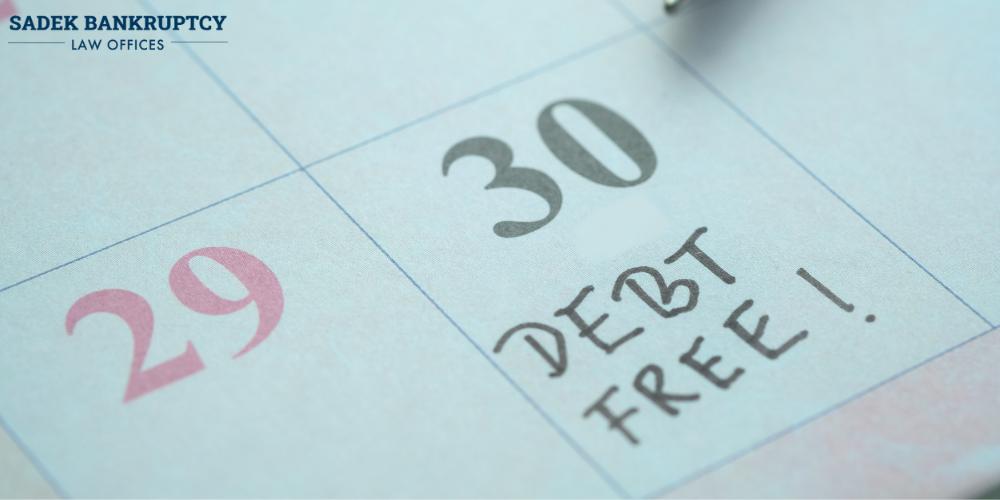
What Is the Success Rate of Chapter 7 Bankruptcy in PA?
The success rate of Chapter 7 bankruptcy can vary depending on how one defines “success.” If success is measured by obtaining a discharge of debts, the success rate is generally high for Chapter 7 bankruptcy filers who complete the process. The majority of Chapter 7 bankruptcy cases result in a discharge, which provides debtors with relief from most of their debts and a fresh start financially.
Chapter 7 Bankruptcy FAQs
When Do I Have to Surrender My Vehicle in a Chapter 7?
In Chapter 7 bankruptcy, whether you have to surrender your vehicle depends on various factors, such as the equity you have in the vehicle, state exemption laws, and your ability to reaffirm the debt. If you have little to no equity in the vehicle or if it’s exempt under state or federal law, you may be able to keep it by continuing to make payments on the loan and reaffirming the debt with the lender.
However, if you’re significantly behind on payments or if the vehicle’s equity exceeds the available state or federal bankruptcy exemptions, the bankruptcy trustee may decide to liquidate the vehicle to repay creditors. This could happen with various types of personal property.
Can I File Chapter 7 Before 8 Years?
There are exceptions and certain circumstances where a debtor may be eligible to file for Chapter 7 bankruptcy before the eight-year waiting period expires. These exceptions include extreme financial hardship or situations where a debtor’s circumstances have significantly changed since their previous Pennsylvania filing.
Can IRS Debt Be Discharged in Chapter 7?
In certain circumstances, IRS debt can be discharged in Chapter 7 bankruptcy, but it depends on several factors. Generally, income tax debt may be eligible for discharge in Chapter 7 bankruptcy if it meets specific criteria, including the following.
- The tax debt must be income tax.
- It must be for a specific tax year that is three or more years old.
- The debtor must have filed a tax return for the tax year in question at least two years before filing for bankruptcy.
- The tax assessment must be at least 240 days old.
Will Filing Chapter 7 Affect My Spouse?
If you have joint debts with your spouse, filing for Chapter 7 bankruptcy can discharge your liability for those debts, but it does not automatically discharge your spouse’s liability. Your spouse may still be responsible for repaying any joint debts, unless they also file for bankruptcy or make other arrangements with the creditors.
However, if you have separate debts that are solely in your name and your spouse does not have joint liability for those debts, filing for Chapter 7 bankruptcy should not directly affect your spouse’s credit report or financial obligations.
How Much Do You Have to Be in Debt to File Chapter 7?
There is no specific dollar amount of debt required to file for Chapter 7 bankruptcy. Instead, eligibility for Chapter 7 is determined by factors such as your income, expenses, and ability to repay your debts. One of the primary considerations is whether you pass the “means test,” which compares your income to the median income in your state and determines if you have enough disposable income to repay your debts.
How Long Can Chapter 7 Trustee Keep Case Open in Pennsylvania?
In Pennsylvania, the Chapter 7 trustee typically keeps a bankruptcy case open until all necessary tasks have been completed and the trustee has fulfilled their duties. This may include tasks such as liquidating assets, distributing proceeds to creditors, resolving any objections, and ensuring compliance with bankruptcy laws.
Will I Lose My House If I File Chapter 7?
In Chapter 7 bankruptcy, non-exempt assets may be liquidated to repay creditors. However, Pennsylvania bankruptcy exemptions or federal exemptions may allow debtors to protect certain assets, including their primary residence, up to a certain value. If your equity in the house falls within the exemption limit, you may be able to keep your home while still obtaining a discharge of your debts.
If your equity exceeds the exemption limit, the bankruptcy trustee may sell your home to repay creditors. However, this is relatively uncommon in Chapter 7 bankruptcy, as most debtors either do not have significant equity in their homes or are able to exempt their equity under state laws.
More About Chapter 7 Bankruptcy
Student Loans: IDR, consolidations & discharge through Bankruptcy
Don’t let COVID destroy your financial future! Bankruptcy can help you get out of the student loan debt cycle and our local Philadelphia bankruptcy lawyers can help you discover the best way forward.
Bankruptcy Petitions: what you need to know before your “341” hearing
In Bankruptcy full disclosure and open communication with your Philadelphia lawyer is essential. Prior to filing a Bankruptcy Petition, our local lawyers will review the bank statements for any issues that could impact your case.
Cost to File Bankruptcy in Philadelphia
This answer does depend on the Chapter of Bankruptcy, whether a Chapter 7 or Chapter 13 and the complexity of the matter as well, but generally legal fees and costs prior to filing are around $2,000 in Philadelphia.
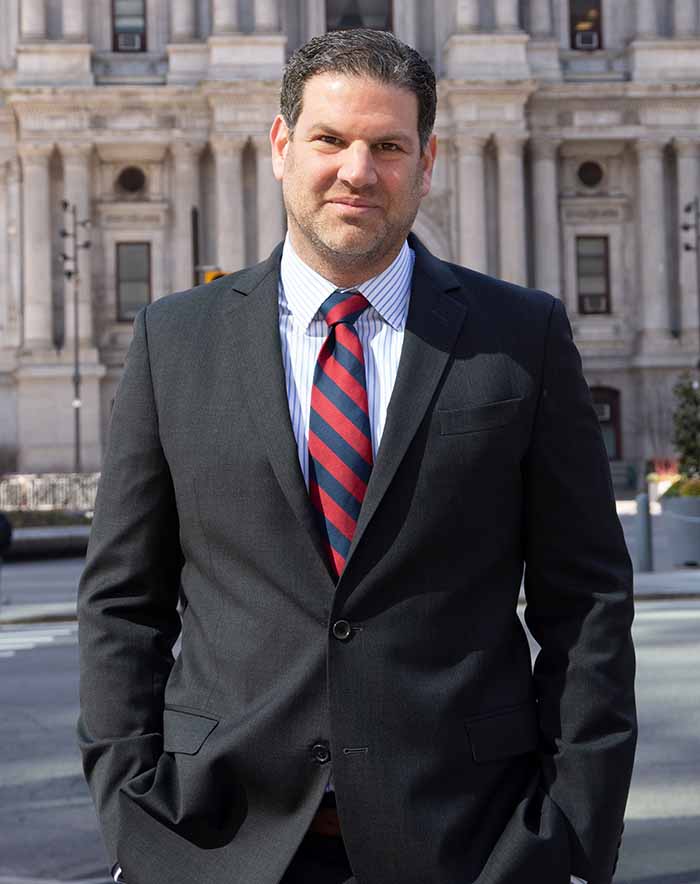
Contact a Chapter 7 Bankruptcy Attorney at Sadek Law Today
The bankruptcy lawyers at Sadek Bankruptcy Law Offices are dedicated to providing quality and cost effective legal guidance to clients who are faced with the difficult decision of declaring bankruptcy.
We work closely with our clients in Philadelphia and the surrounding areas, including Delaware, Montgomery, Bucks, and Chester counties to make sure that bankruptcy is the best option for them.
If you have any questions regarding Chapter 7 Bankruptcy and your legal situation, call the Chapter 7 bankruptcy lawyers and attorneys at Sadek Bankruptcy Law Offices at (215)-545-0008. We offer a FREE and confidential consultation with one of our bankruptcy lawyers in our law offices to further discuss Chapter 7 Bankruptcy.

